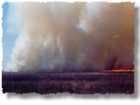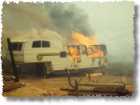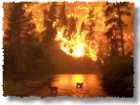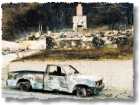
Fire Safety

This page is about protection against wild fires, forest fires, and prairie fires that may threaten your property. Read the page about home fire safety for house fire information.
 Wildfires
Wildfires
Over 100,000 wildfires occur each year in the United States and 80% of those are started by people. Fires can destroy lumber resources, beautiful wildlands, and homes as well as kill animals and people. If you live in a rural area, near forests or open prairie, or in suburbs with lots of green spaces, you need to understand fire prevention and safety guidelines to protect your property.
Just as in housefire prevention, make sure you have these basic fire prevention aids in place:
- fire alarms installed and working
- fire extinguisher available
- evacuation plan ready and practiced
- emergency survival kit with food and water
- emergency contact, such as a relative in another town
 Before a Fire
Before a Fire
Assess your property to determine its fire risk. Tall trees, wild grass, shrubs, and any other combustible materials can all contribute to spreading a fire. During drought or extended lengths of dry weather, this vegetation can become perfect fuel for a fire driven by strong winds. Some simple planning will greatly reduce the threat to your home:
- Make space around your home for firefighting equipment - clear trees and bushes at least 30 feet out.
- When planting trees, space them well apart to minimize the hopping of fire from one to the next.
- Clear out brush between your grass and trees to make it difficult for a grass fire to spread up into the trees. Also, prune branches so the lowest is 7' from the ground.
- Keep your yard healthy, cut, and watered. It is a natural firebreak.
- Clean up dead leaves and twigs from yard, roof, and gutters.
- Store firewood and any other combustible materials at least 30 feet away from your house.
- Have enough garden hose to water down your house and other structures.
- Cover outside vents with 1/8 inch wire mesh to prevent sparks from coming in.
- Use fire-resistant or non-combustible materials in construction whenever you can.
 During a Fire
During a Fire
As a fire progresses, wind and weather may cause it to change course, sometimes very suddenly. When a fire threat is happening, keep your plans flexible and be ready to evacuate immediately. Follow these suggestions as the fire gets closer and closer until it is time to evacuate.
- Fill your car with gas.
- Check that your family emergency kit is ready.
- Listen to radio or TV for evacuation information and directions to take.
- Gather small family heirlooms and treasures and pack them in your car.
- Thoroughly water down all shrubs and grass 15 feet around your house.
- Remove burnable materials for 15 feet around the outside of your house, including brush and small trees.
- Place sprinklers on your roof, closer to the upwind side because that is where the fire approaches from and the wind will blow the water onto your house.
- Move furniture as far from windows and doors as possible, to center of the house.
- Close all windows and doors, vents and shutters.
- Close fireplace damper and use metal ducting tape on dryer vent and other external openings to stop small sparks.
- When you decide its time to evacuate,
- Shut off main gas line
- Turn on the roof sprinklers
- Call your family contact and let them know you are leaving
- Lock your doors
- Call your family contact when you arrive at a safe location
 After a Fire
After a Fire
If you evacuated, returning to your neighborhood may be terribly traumatic. There is a good chance your entire house will be gone and, in that case, be thankful your family made the right choice and is safe. Whether your house is standing or not, you will need to contact your insurance agent for making any claims.
- Do not return until authorities say it is safe.
- Drive carefully, watchful of fallen trees and power lines, hot spots, and damaged roads.
- Check the roof, attic, basement, and every room and closet of every floor for hidden smoke, sparks, or embers that may have been blown inside.
- Call the gas company to have your line turned back on.
- Discard food, medicine, and other items contaminated by smoke.
- Get your water system and heating system checked by a professional.
- If you are fortunate to have little or no damage, see if neighbors need your help.

Find Emergency and Disaster Info at EmergencyDude.com
